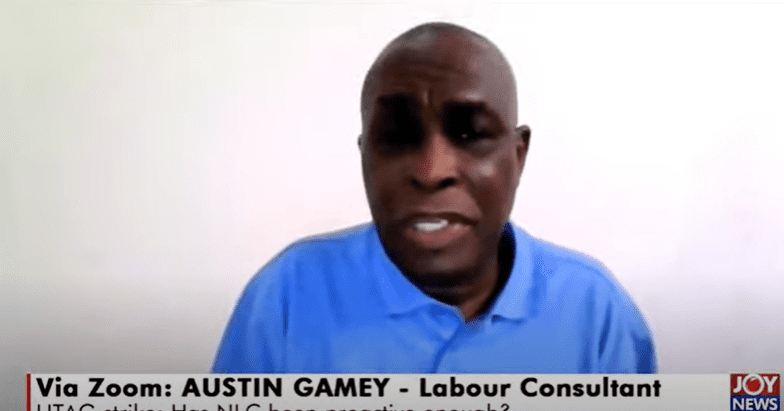Labour Consultant, Austin Gamey has urged the University Teachers Association of Ghana (UTAG) and the government represented by the Fair Wages and Salaries Commission to consider involving a third party in their negotiations.
According to him, “They have no choice, because eventually, the two parties will have to talk. If there’s no talking, there certainly will be no solution.”
Speaking on the PM Express show on JoyNews, Monday, Austin Gamey stated that taking into consideration the strong pose of both parties involved in the negotiation process, it was necessary to try a new approach which involves a third party.
The third party, he believes, would be able to help the parties avoid bottlenecks in their negotiation process and help them reach an amicable solution.
“Sometimes it is better to have maybe a third party. I agree the National Labour Commission is there, but it does seem as if there is some kind of mistrust also from one side to the labour commission.
“That notwithstanding, it’s an institution that we have in place and I believe in them, however, wrong they might be for now I want to say that they can submit themselves to them or the two parties can also agree to have the services of whosoever they want to sit between them and drive the process of the negotiation,” he said.
He added that “By this way they may reach agreement because I think it’s a solvable situation they have on their hands, but maybe the approach is different. And therefore we need some other skill and approach to bring about solution.”
He further called on the government to be totally upfront with the Association about their ability to meet their demands.
He said, “The employer (government) has no choice. Illumination is a key part of labour relations. If you don’t throw light on a situation, and face up the issues clearly, is it – honestly, do they have the money to meet all the demands of UTAG? Do they have a part of it? Or they have nothing? Do they have any growing fear? They should open up the cards. That is illumination."
"And the integrity of the conversation must have no doubts in the minds of any of them. If they don’t have that on the table, and ensure that there is a hundred percent inclusivity in the conversation, they will always be doubting each other, have different perceptions, and it will not help anybody,” he added.
Latest Stories
-
Speaker Bagbin refers final batch of Deputy Minister nominees to Appointments Committee
4 minutes -
Labour MP Bell Ribeiro-Addy sacked as UK-Ghana trade envoy over disability vote rebellion
12 minutes -
First panel sitting held for 9th Ghana Energy Awards
14 minutes -
The surprising Tech Innovations powering today’s online games
21 minutes -
Threat to cedi’s legitimacy isn’t inflation but erosion of public trust – BoG Governor
25 minutes -
Ablekuma North rerun: Police officer interdicted for assaulting journalist faces criminal charges
31 minutes -
Minority walks out of Parliament over row on Akwatia MP’s vacant seat
42 minutes -
BoG cracks down on currency counterfeiters, calls for public vigilance
1 hour -
Emergency MPC meeting will not result in new policy rate – BoG Governor
2 hours -
Mahama pledges public university, roads, and hospitals for the Northeast Region
2 hours -
Commissioner-General of Ghana Boundary Commission calls on GCAA to formally introduce himself
3 hours -
From Mistrust to Meaning: IPR Ghana Reflects on Role of PR in 2025
3 hours -
Registrar Andrews Boateng honoured as he retires from KNUST
3 hours -
GNPC disburses scholarship funds for 2023 and 2024 academic years
3 hours -
Energy Minister rallies support for enhanced efficiency at Ghana Gas
3 hours

